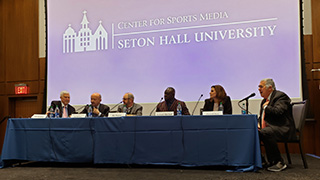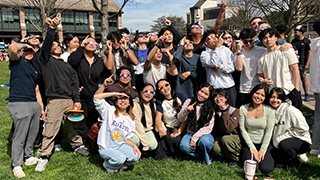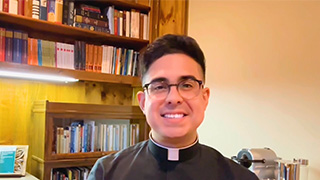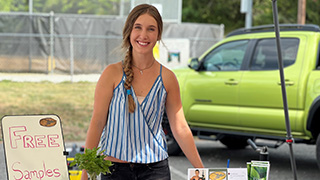5 Tips from a Licensed Therapist on How to Cope in the Time of COVID-19
Thursday, April 16, 2020

The good news in all this: the need to adapt to extreme changes is not new to the human experience. In fact, our adaptative capacity to stay alive, and more importantly, connected with others, is hard-wired and embedded in our neural circuitry. It's what Charles Darwin pointed to when he spoke about evolution as the outcome of the "survival of the fittest" — "fittest" meaning those who can adapt to harsh and ever-changing circumstances in order to survive. But survival is not all that we're after during this time. Instead, our aim here is balance, connection, and sustained hope.
As a clinician for nearly two decades who teaches at Seton Hall, I am confident that adopting any or all of the suggestions below will be in service of this greater goal.
First, stay in the present
Avoid future tripping to the degree that you can. Monitor your thoughts and put things into perspective: write a gratitude list; check in with reliable, informed sources to clarify any misconceptions or extreme thinking; breathe; limit exposure to catastrophizing messaging; and avoid over-analysis that can lead to emotional paralysis.
It is best not to forget that there is a difference between being uncomfortable and suffering. Clarify what your experience is. If it is discomfort, use it to serve those who are experiencing unfathomable suffering in our world. Putting your reality into perspective can help you stay grounded.
From there, contribute to a "one day at time" climate rather than panic. It is collective, positive, prayerful energy that accounts for much of how the world moves.
Second, allow for emotional expression
Many people are facing some type of loss during this time: from cancelled graduations, to postponed hallmark life events, to death. Grief is an important emotion, as are anger, sadness, frustration, and helplessness. Often, in service of maintaining an optimistic stance, we bypass other, more negatively felt emotions. But these emotions are wise — they are messengers that point to the discomfort and unmet needs that have to be attended to and nourished.
Once we allow our emotions to express themselves, especially grief, we can reclaim and tap into the capacity to be creative in meeting our needs. This is an especially important time to give yourself and those around you extra doses of TLC. If you are sad, reach out for comfort. If are frustrated, find a meaningful, healthy outlet. If you are hopeless or feeling helpless, identify what you do have some control or agency over and capitalize on that. Finally, don't forget to be patient with your process. This is really hard.
Third, remain connected
Shared experiences have the incredible capacity to connect people. Particularly when it comes to common causes and struggles, our survival is linked to our need to form solid connections with our tribe. In the case of today's seemingly unwieldy predicament, the shared "enemy" is a virus that must be collectively contained. While the danger of tribalism is division, in this case, the whole of humanity seems to be experiencing an other-worldly sense of connection with people halfway across the globe. Staying connected, then, is essential.
Lessening exposure to things that drain us means more time and energy to invest in things that nourish us. What to do? Write letters, do crafts, call/FaceTime with friends, download game-sharing apps, cook with the family, make a new meal, garden with your children, call your elderly parent or grandmother/grandfather and make sure they're virtually and actively connected, play with your dog, send encouraging and affirming texts to your friends and family, write a play or make a movie that the family can act out, host a virtual Netflix watch party. Whatever you do, stay connected. Show love.
Fourth, get creative and have fun
Managing life is different now. Parents have to suddenly homeschool their children, high school and college students have to learn online, and many people are working from home or not working at all. There are many things beyond our control. And, there are many things that are.
For example, if you have a child who was meant to graduate, getting creative in reclaiming that occasion is possible. What to do instead? Plan a graduation ceremony at home and invite all your relatives to join in remotely. Make a cap and gown, have your graduate write and give the class speech, make a graduation cake, take family pictures, offer the keynote congratulatory address, have all the siblings join in the planning, and make a stage that your child can cross to receive his/her diploma.
Make Fridays formal days: dress like you're going to a special occasion. On another day, throw a dance party or make a scavenger hunt. Online dating? Welcome back to courtship. All alone? Watch the rain just for fun, build a snowman, or sunbathe. Whatever you do, be creative. Find solutions and get back whatever can be reasonably reclaimed.
Finally, serve others
Not surprisingly, volunteering and doing service is a great contributor to positive mental health outcomes. And it's good for the world. At a time when we have a heightened sense of awareness of ourselves and those around us, it can be a great benefit to serve others. It can be a challenge, however, to do for others, especially when we are exhausted in our attempts to adjust to the demands of a new routine and new responsibilities. In that case, start small.
If you're used to volunteering somewhere, email the organization's director or volunteer coordinator and ask what can be done remotely to help — and get your kids involved in the volunteer efforts. Many charities are struggling because of the times. Send your favorite charity a small monetary gift to say thank you if you can. You can also write your child's teacher/daycare worker a letter and have your child draw a picture to send them. Include the many other people who you'd like to say thank you to. Finally, many families in your network may be financially limited due to unemployment. Make an online grocery purchase and have it delivered to their home.
Whatever you do, do your best. That is all anyone can expect at a time like this.
Widian Nicola, D.S.W., LCSW, is an assistant professor in the Department of Sociology, Anthropology and Social Work at Seton Hall University. She is a practitioner-scholar with a particular interest in the narratives of the lived human experience, especially as it pertains to those affected by social inequalities. To unveil the often complex nature of the shared human condition, as well as to disseminate new knowledge that complements, challenges, or expands relevant studies in social work, Nicola created, produced, and published the "Lived Experience Project," a narrative social work podcast that explores unique and evocative stories rarely heard in mainstream media. In the classroom, Nicola invites students to bridge clinical theory to practice and practice to theory as a means of honoring the unique nature of the individual experience. By expanding traditional models of learning, her work has been proven to profoundly enhance the connections students make to their work. Nicola earned her B.A. from Western Washington University, her M.S.W. from Eastern Washington University, and her D.S.W. from Rutgers, The State University of New Jersey.
Categories: Health and Medicine, Nation and World





